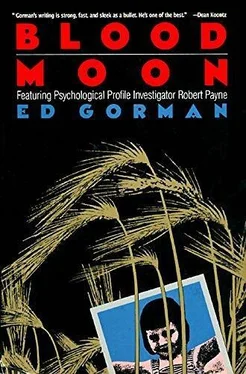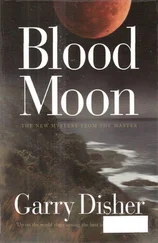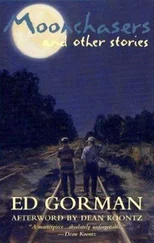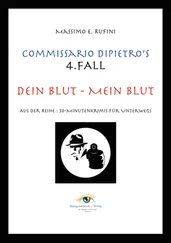By the time the taping was done, he was exhausted and irritable. The photos of the beautiful women had undone him. He lay on his dark bunk in his dark cell and clung to his cock like a drowning man at sea. He wanted one of those beautiful, beautiful women for his very own. He would show them a kind of sex they’d never known before, a kind of sex that would rattle and alter their very existence, and then he would show them other things, so many other things, too.
For the first time in all his prison years, he wept that night.
“Hey, man, you all right?” his cellmate said deep into midnight, the cell block all coughs and cries and furtive grunts of sex, the nightly cacophony of prison life.
“Yeah.”
“Seein’ those chicks make you lonely?”
“Yeah.”
“Me, too,” his cellmate said.
“I wonder what those women get out of it.”
“The chicks who marry guys in stir?” his cellmate said.
“Yeah.”
“You heard what the faggy host said,” his cellmate said. “ ‘A pathological need to nurture.’ I ain’t even sure what that means.”
“Which one you like best?”
“The redhead in the green sweater. God.”
“She was somethin’, all right.”
“How about you?”
“Dark-haired one, I guess. Just somethin’ about her.”
“Great legs.”
“Yeah. But not just that. Something—” And then he remembered. She reminded him of a high-school girl he’d followed home from an ice-cream store one night. She made the mistake of walking by these woods. He just couldn’t help himself. Raped and then killed her with his hands, and then raped her one more time.
His cellmate yawned. “I’m wasted, man. Gotta get some sleep.”
Two minutes later, his cellmate was snoring.
But not him. Oh, no, not him.
He stayed awake all night, dreaming, dreaming.
It’s crazy what you can get sentimental about sometimes. For me, on this particular day, it was field glasses. I hadn’t used this pair of Swarovskis since leaving the FBI.
I sat six car lengths down from the McNally house. Through the field glasses, I watched a man pacing back and forth in the side window, approximately where their dining room was, as I recalled. He was big and looked like he might have been tough once, before the beer caught up to him.
I assumed this was McNally. I also assumed, because of his frantic movements, that the McNallys had not gotten their daughter back. I tried not to think of what that finger in the box had looked like.
He slapped her.
She’d suddenly appeared inside the window frame with him, shouting at him, face raw with tears and fear and rage, and then he’d slapped her the way one man slaps another, enough to move her back at least a foot. Then he slapped her again, backhanded this time, and then she disappeared from the window frame.
In the small town where I grew up, there had been a young married couple famous for their battles. In the early years, he’d given her a few cut lips and a black eye or two. A little later, he started giving her broken arms and legs, once a broken nose. You know the rest, how one night, the sixth year of their marriage it was, he slammed her head too many times into an old-fashioned radiator and killed her before the ambulance arrived. She was twenty-four years old when she died. She was also my cousin. I still had the occasional dream of looking the sonofabitch up when he got out, and slamming his head into a radiator thirty or forty times. See how he liked it.
He came fast out of his house, McNally did, going around the far side to his garage. A minute later, he backed out of the driveway in a new gray Dodge. If he noticed me parked there at the curb, he gave no hint.
He headed west. I waited a minute and a half, then headed west, too.
Following people in a small town is difficult. Following them in the country is nearly impossible.
Fortunately, after only three or four miles, I sensed where he was going. He was headed in the right direction for it, anyway, and I had this feeling — I’ll spare you the lecture on “hunches” that law-enforcement officials always like to give civilians — I had this feeling that he knew something about Nora’s murder last night.
I dropped back, giving him a two-mile advantage.
I drove slowly past farms, remembering what it was like to attach milker units to cows’ teats at a frosty 5:30 A.M.; and what it was like on a sweet warm Indian-summer afternoon to rake the corn I’d just chopped up onto a conveyer belt leading to the silo; and what it was like to lie on the sun side of a summer hill and have five tiny kittens and two tiny rabbits crawling all over you and making you giddy with the pleasure of it. We’d been going to have kids someday and live on a working farm, Kathy and I, but of course it had never happened — not in reality anyway, though sometimes I could fancy it so vividly I’d swear it had actually taken place.
I pulled up on top of the hill overlooking the deserted farm where the blue Caddy had sat last night. The river, sparkling blue, ran behind the farm.
In sunlight, the once-white farmhouse was scabrous, and the ancient red barn almost comical in the way it leaned, and over all was a Poe-like pall, an unnatural silence where human life had been taken with obscene enjoyment. No animals, no flowers prospered here.
I left the car on the shoulder, grabbed my trusty binoculars, and walked down the dusty gravel for a better angle.
McNally had pulled his car down into the barn so it couldn’t be seen from the road. He had yet to emerge from the cool shadows inside.
Far down the road ahead of me, I saw a car hidden inside a great rolling wraith of gravel dust traveling fast toward the farm. Of course, it might well go right on past the farm and then right on past me. But, as I’d expected, it started slowing down when it got within a quarter-mile of the farm, slowing down and using its blinker to signal a left turn.
This car was a blue Toyota four-door, the family model.
The driver did the same thing McNally had: pulled straight into the barn, failed to reappear. I hadn’t had any look at all at his face. I was damned curious.
I went back and sat behind the wheel of my car and turned on the radio to a news station.
No sense in making myself any more obvious than necessary. Sitting in your car was obvious enough. Standing out in the road with binoculars was pointing a bright red arrow at yourself.
They went fifteen more minutes, and still there was no sign of them. They could be doing all sorts of things in that barn, but I guessed it would have something to do with McNally’s daughter. He might be a drunk and a wife beater, but even scum care about their children in their own scummy way.
In the interim, a big gravel truck roared by, rocking my ancient jeep; a long vented truck filled with squealing pigs rumbled past; then a motorcycle with a young helmetless kid raced by; and finally two big bays ridden by two young girls clopped onward, leaving road apples of a curious iridescent green.
I mention all this so you’ll know why I was numbed into indifference when I heard the next car come up behind me. Figured it was just another local pilgrim hastening on to farm or co-op or babbling brook.
Only when I heard the door chunk shut behind me did I realize that the car had stopped and pulled over to the side of the road.
Only when I heard gravel crunch and pop did I realize that somebody was walking through it directly toward me.
By the time I got the window rolled down, she was there. She put her nice arms on my door and leaned in and spoke to me. She wore a sweet innocent perfume.
Читать дальше









